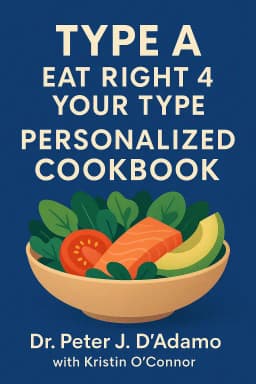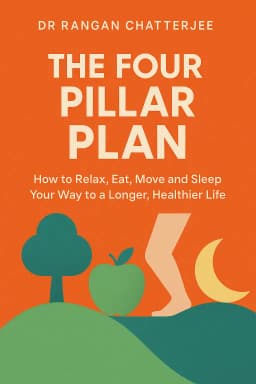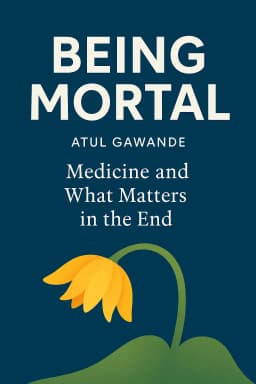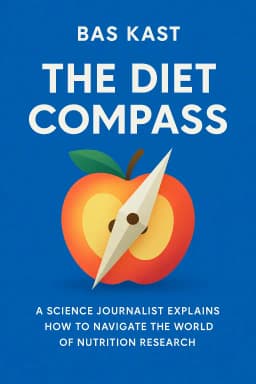
Body Literacy: Decoding the Data of Your Own Health
Golden Hook & Introduction
SECTION
Nova: What if your body came with a user manual? Not a complicated medical textbook, but a simple, daily report that told you exactly what your hormones were doing. A report that could tell you, with data, 'Hey, everything's running smoothly,' or 'Hmm, something's a little off here, maybe we should pay attention.' For so many of us, especially those with menstrual cycles, our bodies can feel like a black box. But what if they don't have to be?
Nova: That's the revolutionary idea at the heart of Toni Weschler's book, 'Taking Charge of Your Fertility,' and it's what we're exploring today. We have the perfect person to unpack this with us, Sc, a product manager in the healthcare industry. Welcome, Sc!
Sc: Thanks for having me, Nova. It's a fascinating topic.
Nova: I'm so glad you're here. Because today we'll dive deep into this from two perspectives. First, we'll explore the idea of the body as a data dashboard, a tool for daily health insights. Then, we'll discuss the politics of this knowledge and why taking charge of your own body's data is a powerful act of empowerment.
Nova: Sc, as someone who literally designs systems to improve health outcomes, this idea of giving the 'user' their own data must resonate with you.
Sc: Absolutely, Nova. Empowering users with their own data is the holy grail of patient-centric care. We talk about it all the time. The more informed a person is, the better their outcomes, the more efficient the system. But it's often just talk. This book seems to be about actually doing it, on a very personal level.
Deep Dive into Core Topic 1: The Body as a Data Dashboard
SECTION
Nova: Exactly! Let's start there. The book is built on this simple but profound idea that three primary signs—your waking temperature, your cervical fluid, and your cervical position—are direct data points from your endocrine system. They are the readouts on your personal health dashboard.
Sc: So it’s not guesswork. It’s quantifiable data that you can track over time. As a product manager, I love that. You're establishing a baseline, then tracking deviations.
Nova: You've got it. And the power of understanding this data is huge. In her introduction, Toni Weschler shares this incredibly relatable story. When she was in college, she kept making appointments with her gynecologist because she was convinced she had a recurring vaginal infection. She was anxious, she was frustrated, and she felt like her body was just... broken.
Sc: I can imagine. That's a stressful feedback loop. You feel like something is wrong, you seek help, and you're told nothing is wrong, which just increases the anxiety.
Nova: Precisely. And over and over, the doctor would run tests and give her that unsatisfying line: 'There's really nothing there.' It wasn't until years later, when she took a class on Fertility Awareness, that she had this massive lightbulb moment. What she thought was a sign of infection was actually completely normal, healthy, fertile cervical fluid. It was a feature, not a bug!
Sc: Wow. From a product design perspective, that is a classic, catastrophic user experience problem. The user is fundamentally misinterpreting the system's core feedback. It's a failure of education and onboarding. The user wasn't given the 'key' to read the 'map.'
Nova: That's such a great way to put it! A failure of onboarding. And we pay the price for it. Think of the time, the money, the anxiety spent on those unnecessary doctor visits.
Sc: For sure. In healthcare tech, we spend millions trying to build complex AI algorithms to diagnose things from afar. But here's a case where the most powerful intervention is simple knowledge. Giving a person the ability to interpret their own, naturally-produced data fundamentally changes their relationship with the healthcare system. It can prevent so many unnecessary and costly interactions.
Nova: And it's not just about avoiding anxiety. The book is filled with stories of people using this data for good. There's this one story about a couple, Terry and James. They had been trying to get pregnant for over a year and were starting to worry they were infertile.
Sc: The one-year mark. That's the standard medical definition that triggers the 'infertility' label and a cascade of tests and interventions.
Nova: Exactly. So one day, Terry calls Toni Weschler, the author, in a panic. She's describing this discharge she's having, and her husband James gets on the phone and is also really concerned. They're convinced it's some kind of infection that's preventing them from conceiving.
Sc: So, the same pattern as the author's own story. They're interpreting a data point as a problem.
Nova: Yes! But Toni asks them to describe it. They say it's clear, slippery, and really stretchy. James even exclaims, "Toni, it's 10 inches!" And Toni just laughs and says, "Well then, what the hell are you doing talking to me? Get off the phone and take advantage of it!" She recognized it immediately as peak-quality fertile cervical fluid. And guess what?
Sc: They conceived.
Nova: They conceived their son that very night. A piece of information, a single re-framing of a data point, changed their entire lives and saved them from a potentially long and painful journey through infertility treatments.
Sc: That's incredible. It shows that the 'product'—the human body—is working perfectly. The problem was the lack of a user manual. Providing that manual is a low-cost, high-impact intervention. It's the 80/20 rule of healthcare. This is the 20% of knowledge that solves 80% of the problem for many people.
Deep Dive into Core Topic 2: The Politics of Body Literacy
SECTION
Nova: I love that framing. And that story about Terry and James, who were on the verge of being labeled 'infertile' because of a simple misunderstanding, brings us perfectly to our second big idea. Why? Why isn't this basic, life-changing information common knowledge? This is where the book gets really political.
Sc: The 'why' is always the most interesting question. If the solution is so simple and effective, why isn't it the first thing we learn?
Nova: Right? Weschler points out a few systemic reasons. First, modern Fertility Awareness gets wrongly lumped in with the old, notoriously unreliable 'Rhythm Method,' which was just calendar-based guessing. This is a data-driven, scientific method, but the bad reputation sticks.
Sc: So, a branding problem.
Nova: A huge branding problem. Second, and this is a big one, there's no recurring profit in it for pharmaceutical companies. A book costs fifty dollars once. Hormonal birth control or years of IVF treatments cost thousands and thousands. The economic incentives of the healthcare industry are not aligned with this kind of empowerment.
Sc: That's a system designed to create dependent customers, not empowered users. If a user can solve their own problem, they're no longer a source of revenue. It's a conflict of interest that's built into the business model of many parts of healthcare.
Nova: And the third reason she gives is that it's just not a priority in most medical schools. Doctors get very little training in it, so they can't recommend what they don't know. The system perpetuates its own ignorance.
Nova: Sc, I know you have an interest in trailblazing figures like Ruth Bader Ginsburg, who fought against systemic barriers. Does this feel like a similar kind of struggle to you? A fight for access to information and bodily autonomy?
Sc: Absolutely. It's a form of gatekeeping, 100%. When knowledge is held exclusively by an 'expert' class—whether it's lawyers interpreting the constitution or doctors interpreting our bodies—it creates an inherent power imbalance. The act of learning this method, of charting your own cycle, is a way of reclaiming that power.
Nova: I've never thought of it that way. It's a quiet act of rebellion.
Sc: It is! It's saying, 'I am the primary expert on my own body, and I have the data to prove it.' It reminds me of the 'Our Bodies, Ourselves' movement from the 70s. This is the 21st-century version of that. It's a quiet, data-driven rebellion.
Nova: A data-driven rebellion! I love that phrase. It's not just about personal health; it's a political statement. You're creating your own evidence, your own case file to bring to the table.
Sc: And as a product manager, that's the dream! An engaged, informed user who can give us high-quality, specific feedback. A patient who walks into their doctor's office with a binder full of charts isn't an inconvenience; they are the ultimate 'power user.' They can co-create their own healthcare plan with their provider. They can point to the data and say, 'My luteal phase has been shortening for six months, let's investigate that,' instead of just saying 'I feel off.' It changes the entire dynamic.
Synthesis & Takeaways
SECTION
Nova: It really does. So, to bring it all together, we've seen how the methods in 'Taking Charge of Your Fertility' can be viewed as so much more than their name suggests. It's a system for creating a personal data dashboard, for becoming fluent in the language of your own body.
Sc: And we've discussed how learning that language isn't just a health practice, it's an act of empowerment. It's a way of challenging a system that has, for various reasons, historically withheld that knowledge.
Nova: It transforms you from a passive recipient of care into an active, informed participant.
Sc: Which, I believe, is the true future of healthcare. It has to be.
Nova: I agree. So, for everyone listening, we want to leave you with a thought. You don't have to go out and start charting your temperature tomorrow, unless you want to! But the next time you have a question about your health, or something just feels a little off, ask yourself this simple question: What is the simplest data point my body is already giving me?
Sc: It could be your energy levels, your sleep patterns, your mood, your digestion...
Nova: Exactly. What's the data? And how can you start paying attention to it in a consistent way? The answer might be the first step to becoming the CEO of your own health. Sc, thank you so much for bringing your brilliant systems-thinking brain to this conversation.
Sc: It was my pleasure, Nova. This was fantastic.









